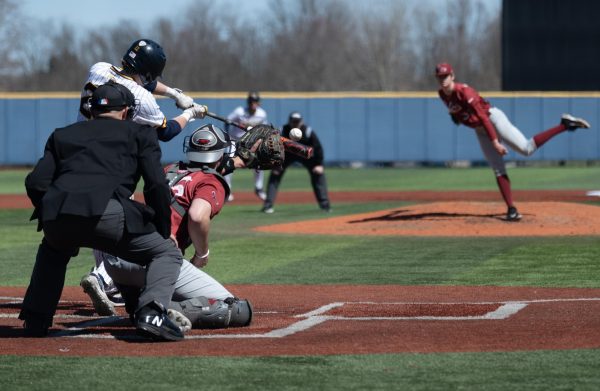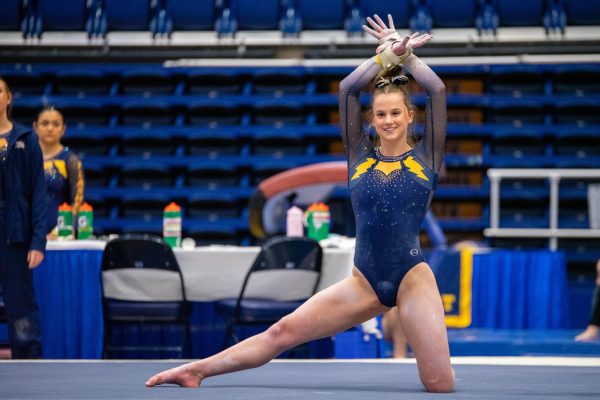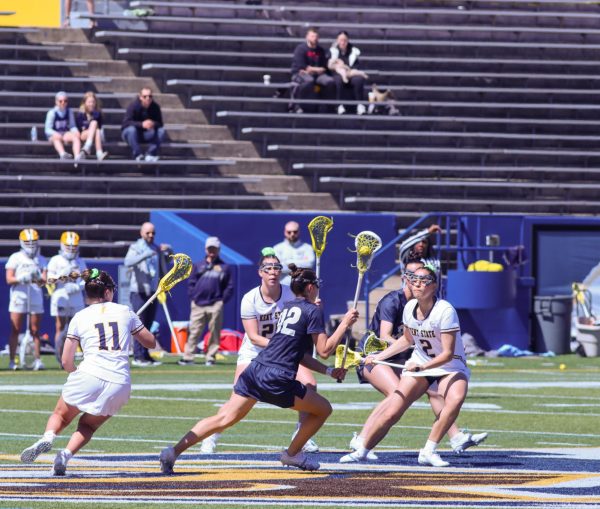Sports with Shook: What’s in a name
January 17, 2013
The Cleveland Browns held a press conference Tuesday to reveal the new name for its home, Cleveland Browns Stadium. The 14-year-old structure will officially be named FirstEnergy Stadium, Home of the Cleveland Browns, pending approval from the Cleveland city council. The Akron-based electric company purchased the naming rights for an undisclosed amount of money and time.
To discuss this change, I felt it was necessary to bring in a co-host from our sports-talk show on Black Squirrel Radio, Sports With Shook. Kory Kubasek makes his first appearance in the Sports With Shook column to provide the other side of the debate over the stadium’s new name.
Nick’s takeI am a huge opponent of corporate stadium naming rights. Why? Because they often create awkward titles, mouthfuls for broadcasters and writers, and a wider margin of error for everyone involved. Some poorly executed corporate names include Sleep Train Arena in Sacramento, Calif., and O.co Coliseum in Oakland, Calif. Some announcers refer to it as “Oh-co” or “Oh-dot-co” Coliseum. I don’t think I need to explain the humor associated with a mediocre basketball team’s arena including the word “sleep” in its name. Kings basketball is already boring, and sometimes I would rather sleep than watch them play. Clunky stadium names include Mall of America Field at the Hubert H. Humphrey Metrodome in Minneapolis, Minn. and Sports Authority Field at Mile High Stadium in Denver, Colo. The most ironic stadium name is University of Phoenix Stadium, because the University of Phoenix is an online institution that does not have an athletics program. It is rare that a company and team successfully name a facility and give it a catchy moniker from the start. One example of this uncommon success is Quicken Loans Arena in Cleveland. I was highly opposed to the new name for the arena in the early-to-mid 2000s. It was always Gund Arena to me, but the Cavs were never too good to give it much nostalgia. An overweight Shawn Kemp had a few average years there, a young Andre Miller started his marathon career there, Dajuan Wagner mostly watched from the bench while dealing with kidney problems there, oh, and Chris Mihm and his razor-sharp, gel-spiked hair ran up and down the court there. But otherwise, it was just the place where the Cavs struggled for most of my life. The biggest reason I opposed the name change? They were planning on calling it “The Q” for short. The Q? Seriously? Turns out, it worked — quite well, actually. The success of the Cavaliers, thanks in large part to a certain kid from Akron who wore No. 23, made northeast Ohioans associate “The Q” moniker with fond thoughts of an extremely successful basketball team. The same cannot be said about the other formerly owner-named stadium in Cleveland, Progressive Field. One successful season occurred there since the name changed in 2007. It has mostly been a place of sadness and frustration since. Cleveland Browns Stadium has seen similar failure in its 14-year existence. The Browns have gone to the playoffs just once (2002) since moving into the new stadium in 1999, and it hasn’t hosted a playoff game. Change might be welcome there, but just not for me. I’ve been attending games in the same seat in section 149, row three, since it opened in August 1999. The paint at the ends of the rows has faded since then, and it might be time for a makeover there. But thoughts of artificial turf and a dome are not welcome to my consciousness. Cleveland is a hard-nosed, blue-collar town. I’ve witnessed multiple games in which the elements alone caused a victory for the Browns. The Browns beat the Buffalo Bills 8-0 in a blizzard in 2007 (when I say blizzard, I mean it was snowing so hard that my father, older sister and I had to walk backward to the stadium; the snow stung our face too much to walk forward). It happened again in 2012: a 7-6 win over the San Diego Chargers in windy, rainy conditions. But when talking about the name, thoughts of tradition enter my mind. Cleveland’s old stadium was simply named Cleveland Municipal Stadium. Owner Al Lerner felt the stadium should just be named Cleveland Browns Stadium when he purchased the rights to the expansion franchise in 1998. Now with a new owner, that mindset is gone with the Lake Erie winds. The renditions of exterior and interior signage are impressive and clean — I will not deny that. But I won’t be as proud to tell folks I’m headed to FirstEnergy Stadium. It’s just too sterile and corporate for me. Contact Nick Shook at [email protected]. |
Kory’s takeAkron-based FirstEnergy Corp. has purchased the naming rights to Cleveland Browns Stadium. This hometown company also owns the rights to the soccer field at the University of Akron and has heavy advertising with the Cleveland Indians and Akron Aeros as well. With this rumored $10 million per year purchase, they join the likes of Quicken Loans and Progressive to own stadium names in Cleveland. I have never been partial to the name Cleveland Browns Stadium. I never understood why it was so important to have when the team came back in 1999. It was never Cleveland Browns Stadium before; it was always Cleveland Municipal Stadium. Personally, I think comedian Mike Polk said it best when he described the stadium as a “factory of sadness.” A name change is welcome, and having a hometown company do so makes it even better for me. After hearing FirstEnergy bought the naming rights, all I could think of is Browns radio play-by-play man Jim Donovan shooting off puns rapid fire during games like Rambo in Vietnam. “Wow, the defense is lights out at FirstEnergy Stadium.” “Whoa, that was an electric play here at the stadium.” Puns aside, a good question that pops into mind is, what will the stadium’s nickname be? Quicken Loans Arena beautifully shortened into “The Q” and Progressive Field really is simple enough (I still call it “The Jake”). “First Field,” has a nice fit to it considering it is near Canton, the birthplace of professional football. A few other ideas are “FE Field,” “the Electric Tundra,” or “the Field That Edison Built.” By and large, this is good for FirstEnergy, a company that saw its stock drop approximately 7 percent this year, and Browns owner Jimmy Haslam III. Does this change guarantee us going to the Super Bowl? No. Does it promise we’ll get awesome free agents? No. But this is one of many steps that a new owner is taking to bring the Browns back to the pinnacle of football. Contact Kory Kubasek at [email protected]. |























